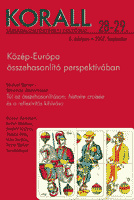Tanárok, egyesületek, államok. A középiskolai tanárok professzionalizációjának kezdete porosz–magyar összehasonlításban
Teachers, societies, states. The outset of secondary school teachers’ professionalization in Prussian-Hungarian comparison
Author(s): Márkus KellerSubject(s): History
Published by: KORALL Társadalomtörténeti Egyesület
Summary/Abstract: This paper addresses questions of Hungary’s 19. century modernization through the comparative study of Hungarian and Prussian secondary school teachers’ professionalization and their relationship with the state. Was it a specifically Hungarian route to modernization or is it merely a belated imitation of Western patterns that sources reveal? Based on the comparison it can be argued that although the professionalization of the Hungarian secondary school teachers started later than that of the Prussians, it yielded results earlier in terms of autonomy, expert status and society organization. We suggest that it is due to a closer at the same time more critical relationship with the state, that is, to the diff erent conceptualization of the state from the one of the Prussian teachers. What explains this more equal relationship and the diff erent direction of development that it gave rise to? Our analysis distinguishes four factors. The first is the favourable politics towards societies of the liberal era that followed the Settlement and lasted until the mid 1870s. In such an environment it was much easier for a professional-advocacy group to function and achieve results than in Prussia, where the government was much less open towards societies. The second factor is the diff erent role of the church in education. In Hungary primary education entirely, while secondary education to a large extent was controlled by the protestant and the catholic church(es). In that context the liberal Hungarian government was content with the establishment of an independent new “power” centre of education policy that declared itself to be beyond religious affi liations. In Prussia churches had lost their decisive role long before, so the government did not need a professional pressure group to get its educational policy initiatives through. In this light it becomes understandable that the two societies had diff erent opportunities. The third factor is constituted by the personal connections between the government – and its representatives – and the two societies. In Hungary, after 1849 the protestant as well as the catholic secondary schools played an eminent role in the fi ght against Germanization. In addition, a number of offi cers of the teachers’ society actively participated in the revolution and in the war of independence, hence had good and personal connections with the new elite that come to power after the Settlement. Such personal and good connections and attachments – facilitating advocacy – cannot be observed between the teachers of the Prussian cantonal society and the Prussian government. Finally, the united stand of the Hungarian teachers contributed to the better possibilities of advocacy of the National Secondary School Teachers Society. The clear opposition between fi elds of arts and humanities and sciences characteristic in Prussia cannot be observed with regard to Hungary in the period under study. Our study clearly demonstrates that despite r
Journal: Korall - Társadalomtörténeti folyóirat
- Issue Year: 2007
- Issue No: 28-29
- Page Range: 59-87
- Page Count: 29
- Language: Hungarian

